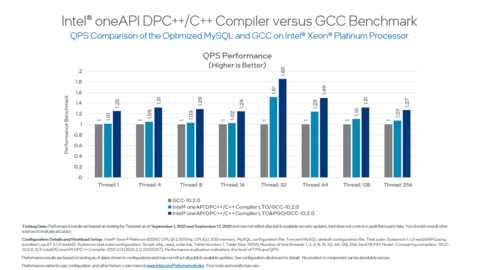oneAPI Tools Enhance Performance of TencentDB for MySQL
Tencent, a leading public cloud service provider in China, has achieved an impressive up to 85% performance boost for its TencentDB for MySQL by utilizing Intel oneAPI Tools. This enhancement, based on Intel® Xeon® processors, showcases the effectiveness of the Intel® oneAPI DPC++/C++ Compiler and Intel® VTune™ Profiler in optimizing cloud database performance.
- Achieved up to 85% performance boost for TencentDB for MySQL.
- Utilized advanced tools like Intel oneAPI DPC++/C++ Compiler and VTune Profiler.
- None.
Tencent,

Tencent,
“Tencent’s results optimizing MySQL demonstrate the importance both of using up-to-date developer tools like the Intel oneAPI DPC++/C++ Compiler and the latest optimization techniques using the Intel VTune Profiler. The significant improvements in performance yield either faster time to results or more results for business-critical applications.”
–
Why It Matters: Distributed data storage serves a critical role across industries and use cases, including internet, finance and e-commerce. Solutions like TencentDB for MySQL provide developers with a service for distributed data storage that supports easy setup, operation and expansion of relational databases in the cloud. However, an ongoing rise in storage and data processing requirements and demands for higher performance makes it challenging for developers. Optimizing for higher MySQL performance can help organizations process transactions and data queries faster, helping to meet evolving business and customer needs.
How It Works: Intel is leading the open ecosystem by combining its unique strengths in hardware and software tools with a commitment to building strong, open software that accelerates compute and innovation. The Intel oneAPI DPC++/C++ compiler is used for parallel programming applications and delivers productivity and performance across CPUs and accelerators. Using the compiler, the teams drove link time optimization (LTO) and profile-guided optimization (PGO) methods that helped Tencent build a high-performance MySQL. With LTO, the compiler applied various forms of intraprocedural optimization (IPO) to the entire program, allowing for deeper analysis, more optimization and better program performance. PGO provides information to the compiler about areas of an application that are most frequently executed. Together, these techniques delivered up to an
Intel® VTune™ Profiler was used to collect the performance of MySQL based on the default configuration and to identify and analyze hot spots in call stacks to find additional areas to maximize performance.
More Context: Intel and TencentDB for MySQL Case Study
Intel Partner Stories: Intel Customer Spotlight on Intel.com | Partner Stories on Intel Newsroom
About Intel
Intel (Nasdaq: INTC) is an industry leader, creating world-changing technology that enables global progress and enriches lives. Inspired by Moore’s Law, we continuously work to advance the design and manufacturing of semiconductors to help address our customers’ greatest challenges. By embedding intelligence in the cloud, network, edge and every kind of computing device, we unleash the potential of data to transform business and society for the better. To learn more about Intel’s innovations, go to newsroom.intel.com and intel.com.
1MySQL performance is affected by many factors, one of which is its configuration. Different configurations may have a different impact on performance. Tencent used a configuration file, and built MySQL, both with LTO and PGO, and evaluated the performance with Sysbench. The QPS performance of oltp_read_write.lua is shown in the above figure.
Intel does not control or audit third-party data. You should consult other sources to evaluate accuracy.
Performance varies by use, configuration, and other factors. Learn more at www.Intel.com/PerformanceIndex.
Your costs and results may vary.
Intel technologies may require enabled hardware, software, or service activation.
©
View source version on businesswire.com: https://www.businesswire.com/news/home/20220901005271/en/
becky.want@ketchum.com
Source:
FAQ
What performance improvement did Tencent achieve for TencentDB for MySQL?
What tools did Tencent use to enhance database performance?
Which processors are TencentDB for MySQL based on?
How does the performance boost impact business applications?







